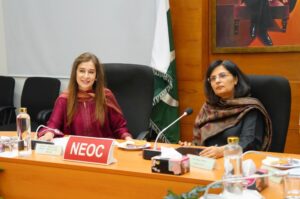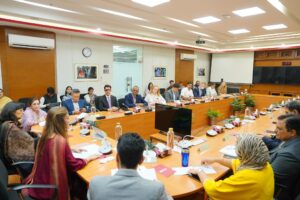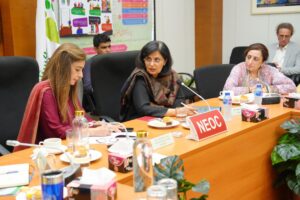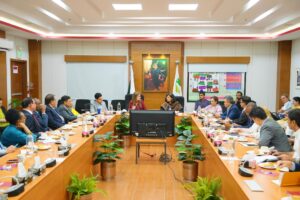 https://twitter.com/home https://www.facebook.com/Shabbir.Hussain191
https://twitter.com/home https://www.facebook.com/Shabbir.Hussain191By Shabbir Hussain
ISLAMABAD, Aug 6 (Diplomatic Star): In a landmark development for Pakistan’s public health landscape, Dr. Sania Nishtar, Chief Executive Officer of Gavi, the Vaccine Alliance, visited the National Emergency Operations Centre (NEOC) for a high-level meeting aimed at reinforcing the country’s immunization efforts and accelerating progress toward polio eradication.
Dr. Sania Nishtar was warmly welcomed at the NEOC by Ayesha Raza Farooq, the Prime Minister’s Focal Person on Polio Eradication and Chairperson of the National Commission on the Rights of Child Pakistan, who acknowledged her pivotal role in global vaccine delivery and commitment to strengthening health systems in developing countries.
The meeting brought together senior representatives from some of the most influential global health organizations—including the Bill & Melinda Gates Foundation, the World Health Organization (WHO), UNICEF, and the Centers for Disease Control and Prevention (CDC)—all working in close coordination with Pakistan’s national and provincial health teams.
The gathering served as a critical moment for aligning strategies and enhancing partnerships to improve routine immunization, strengthen health systems, and ultimately ensure that every child in Pakistan has access to life-saving vaccines.
Shared Vision for a Healthier Pakistan
Welcoming Dr. Nishtar and the international delegation, senior Pakistani health officials reiterated the country’s unwavering commitment to both eradicating polio and building a resilient, integrated healthcare system.

The participants emphasized that immunization is not a standalone effort, but a vital pillar in the broader framework of public health.
“Our goal is not just to eradicate polio,” said a senior health official, “but to use this opportunity to build a health infrastructure that protects every child from preventable diseases. We are advancing with a unified strategy that places both routine immunization and disease surveillance at the core of our mission.”
The presence of Dr. Sania Nishtar—an internationally respected public health advocate and former Special Assistant to the Prime Minister on Social Protection—further energized the discussions.
As the CEO of Gavi, she brings global experience in mobilizing support for vaccine delivery and strengthening health systems in low- and middle-income countries. Her visit signified not only Gavi’s continued support for Pakistan but also a renewed urgency to deliver long-term, sustainable results.
Key Commitments and Joint Actions
The meeting concluded with a shared agreement on several strategic priorities:
Deepening coordination between the Polio Programme and the Expanded Programme on Immunization (EPI): Recognizing that greater efficiency and impact can be achieved through an integrated approach, the participants committed to breaking silos between the polio and routine immunization campaigns.

This alignment will help ensure that no opportunity is missed to immunize children during outreach activities and door-to-door campaigns.
Expanding essential health services in high-risk districts: The government and its partners pledged to deliver a comprehensive package of services—including routine immunization, nutrition interventions, clean water supply, and sanitation (WASH) facilities—especially in the most vulnerable and underserved areas.
These integrated efforts are critical not only for improving child health outcomes but also for building trust within communities.
Developing a joint roadmap for sustainable vaccination coverage: The coalition agreed to formulate a national immunization roadmap, focusing on high-impact strategies, better resource utilization, and stronger data systems to monitor progress. This plan aims to ensure long-term success in reaching every child with essential vaccines.
Power of Partnership in Public Health
Throughout the session, speakers repeatedly emphasized that collaboration is the backbone of success in public health.
The robust presence of international organizations, technical experts, and national policymakers underlined the importance of collective action in facing persistent health challenges.
“A united front is our greatest asset in public health,” said a senior NEOC official. “We are grateful for the powerful coalition present here today—including Gavi, WHO, UNICEF, CDC, and the Gates Foundation—who continue to stand shoulder to shoulder with Pakistan in our mission to protect our children.”

Dr. Sania Nishtar echoed the sentiment in her remarks, stating, “Pakistan has demonstrated incredible resilience in the fight against polio. With the right investments and partnerships, we can now extend that success to broader immunization efforts. Gavi is proud to support Pakistan in achieving universal vaccine coverage.”
The Gates Foundation’s representatives also reaffirmed their support, pointing out that Pakistan remains a global priority country for health investments, particularly in polio eradication and immunization system strengthening.
They praised Pakistan’s recent progress and encouraged sustained political commitment, community engagement, and health worker support.
Building Resilience for the Future
The integration of routine immunization with polio operations is viewed by experts as a strategic pivot that could transform Pakistan’s public health architecture.
With community-based surveillance, mobile outreach, and local partnerships already in place through the Polio Programme, Pakistan has an existing platform that can be expanded to deliver a full range of health services.
Officials also discussed the need for capacity building, better cold chain management, and robust data systems to ensure vaccines are delivered efficiently and equitably.
Community trust, they noted, is vital—particularly in areas where misinformation or socio-political dynamics pose challenges to immunization drives.
By focusing on inclusive strategies, such as empowering female health workers, engaging religious and community leaders, and addressing local needs, the health ministry aims to close immunity gaps and ensure no child is left behind.

The Road Ahead
With renewed momentum and a shared roadmap in place, Pakistan now looks to execute these commitments with precision and speed.
The next few years are critical for reaching the 2026 global goal for polio eradication and achieving universal childhood immunization.
The National Emergency Operations Centre will serve as the nerve center for monitoring progress, adapting strategies, and driving implementation in partnership with provinces, civil society, and international donors.
As the meeting concluded, there was a shared sense of optimism. The path to a healthier Pakistan is clearer than ever: it runs through partnership, policy alignment, and relentless execution.



















